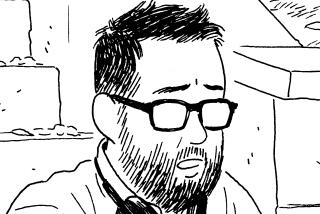David L. Ulin on why books matter
- Share via
The following is excerpted from Los Angeles Times book critic David L. Ulin’s “The Lost Art of Reading: Why Books Matter in a Distracted Time” (Sasquatch: 152 pp., $12.95), which comes out Nov. 1. The book grew out of an essay that appeared in The Times in August 2009; you can read the original piece online at URL TK.
Since the moment I discovered literature, I’ve surrounded myself with books; every room, office, or apartment I’ve ever occupied has been had its walls, floors, tables, nearly all available surfaces, covered with the effluvia of print. Since the moment I discovered literature? No, not even: Before I would have thought to call myself a reader, books were as essential to me as air. I grew up in a house full of them, and among my earliest memories is one of scaling the floor-to-ceiling shelves in my parents’ apartment on the Upper East Side of Manhattan to search out volumes with engaging cover illustrations, at which I’d stare for hours, trying to imagine myself into the scenes they portrayed. At the time, I couldn’t have been older than 6 or 7, and the images that attracted me were those that mixed history and adventure, the fantastic and the real. I remember being struck by an old Bantam paperback novel about Genghis Khan, which featured a painting of the Mongol leader on horseback, at the head of a regiment of troops. Although I never did read the novel (nor develop a taste for historical fiction), I still recall the joy of contemplating that portrait, the way it made me feel as if a world had opened up in the palm of my hands. It is this, I think, that draws us to books in the first place, their nearly magical power to transport us to other landscapes, other lives.
For a long time, I read for just that reason, as if books were ripcords, escape hatches, portals out of my own life. I carried them with me everywhere: school, sleepovers, vacations, quick rides on the subway — any unattached moment, any place or piece of time. The summer I turned 13, in 1974, I spent a miserable two weeks holed up in a bunk at a Vermont tennis camp, wearing the same clothes every day, talking to no one, reading Philip Roth and Bernard Malamud, neither of whom I fully understood. (The book I truly loved that summer was “Killer: Autobiography of a Mafia Hitman” by the pseudonymous Joey, a mob assassin who recounted, in glorious textured detail, the saga of his 38 kills. I also loved watching an older girl with long brown hair dance alone to “I Saw Her Standing There” in the camp rec room after dinner one July evening, her body glowing in the fading dusk light, sinuous yet somehow still at once.) I was drawn to books that were beyond me; not all that many months later at a family Thanksgiving, I found myself digging through Robert Daley’s “ Target Blue,” a 600-page account of the author’s year as a New York deputy police commissioner. I spent the long gray afternoon and evening tuning out the brittle clannic gossip, ignoring the tensions, all those unfulfilled resentments, to see instead how many pages I could put away. Partly, this was emblematic of a false sophistication, a desire to shed the adolescent’s greasy skin. I was not particularly good at being a 13-year-old (is anyone?), and I longed to be part of the adult world, a world I only dimly understood. Yet even more, I’ve come to think, it had to do with reading as a matter of imaginative or emotional reinvention, less a way out of my circumstances than a way out of who I was. What I was after, in other words, was not merely an escape but also a point of entry, a passport, or a series of passports, not to an older version of myself but to a different version — to the person I wanted to become.
(c) 2010 by David L. Ulin; reprinted with permission from Sasquatch Books.
More to Read
Sign up for our Book Club newsletter
Get the latest news, events and more from the Los Angeles Times Book Club, and help us get L.A. reading and talking.
You may occasionally receive promotional content from the Los Angeles Times.








